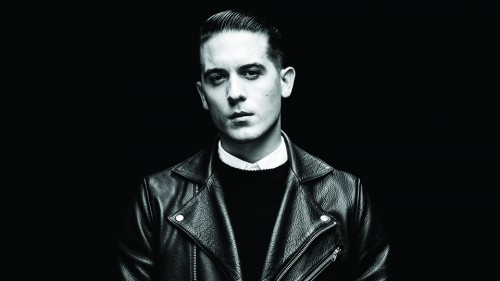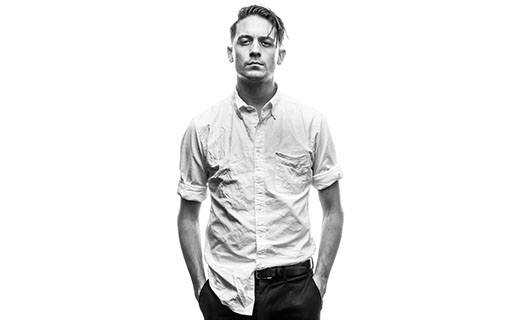You can be certain that whatever Oakland, California rapper G-Eazy says, he means, as illustrated so eloquently in his latest single “I Mean It”, surging through speakers this summer with Rick Ross on the remix. It’s also the nonchalance and casualness in the way he speaks that makes him so believable. His honesty trickles down to his interview where G-Eazy takes time to speak about the latest project These Things Happen, why it should be spun all summer and what it’s like touring Europe for the first time as an up-and-coming star.
HOW WAS EUROPE? Europe was f*cking awesome, but it was tiring a little bit for sure.
HOW HAVE YOU SEEN THE FAN BASE IN EUROPE DIFFER FROM THE LAST TIME YOU WERE THERE AND FROM NORTH AMERICA? The fan base is weird. In terms of size and energy, it’s pretty relatable to the States in terms of what I was starting off at. And being that my whole style is really organic, it’s not like I’m all over the radio all day or anything, it’s more word-of-mouth based, that’s just how it works. When I did my first U.S. tour like a year-and-a-half ago, there was like 300 to 400 people a night and that’s how it was over in Europe. Any time you go somewhere for the first time, that’s about what you can expect and then you come back. But the energy was crazy. Just knowing that people thousands of miles away from where these songs are made knew the words and were screaming them out loud is awesome.
ANY HIGHLIGHTS? I would say Paris; because that was the city I was most worried about. It felt farthest away from American culture. I don’t know, I could be totally wrong. In London, it’s not that far from New York. They speak English, obviously. I guess Germany was awesome, but there’s something about Paris that was like, “Does anybody even know me out there?” But I think that was the biggest show with the loudest crowd. It was awesome.
BESIDES TIRED, WHAT DID YOU FINISH THE TOUR FEELING LIKE? Well, tired for sure. Because we didn’t have a bus or anything, but we had all our equipment and gear so we would have to wake up in the hotel room super early, go get in a cab and go to the train station, put all our bags on the train, take the train, get in another cab to the hotel, check in for an hour, go to the venue and do the show, go back to the hotel and wake up early morning and repeat. Ultimately, the energy from the fans made it worth it.
YOU HAD TO DO THE LUGGING YOURSELF OR WOULD YOU SAY THAT YOU REACHED THE POINT WHERE YOU CAN HIRE PEOPLE TO DO THAT FOR YOU? We got money on the tour, but it’s like, be smart and bring as few amount of people as possible.
SO THE NEW PROJECT, THESE THINGS HAPPEN, WHAT WAS THE PROCESS OF PUTTING IT TOGETHER? It was a long process. It was something that I wanted to take my time with and do right. In the past, I never felt like I really had the time to do an album how I wanted. You’re always trying to balance the time aspect, because if you take too long to put something out, you start to lose momentum with the quality aspect. You don’t want to put something out that’s shit, but you still can’t take forever. It’s one of the age-old battles between the creative and the strategists. But with this one, I feel like we gave ourselves enough time to pay attention to every little detail. Every second of that album is exactly how I wanted it. It has a cohesive feel to the whole record.
It was something that I wanted to take my time with and do right. In the past, I never felt like I really had the time to do an album how I wanted. You’re always trying to balance the time aspect, because if you take too long to put something out, you start to lose momentum with the quality aspect. You don’t want to put something out that’s shit, but you still can’t take forever.
GOING INTO IT, WHAT DID YOU WANT IT TO SOUND LIKE? There was a creative left-turn with this album. The music is more atmospheric and wet and the subject matter reflects how crazy this chapter of my life is right now. A lot of this record was written on tour when the parties and madness and all of that surrounded me, and the music reflects that. It’s kind of like, living in this constant haze of everything that’s going on and trying to make sense of it and keep my head on straight. Enjoy it, but stay grounded.
YOU BEING SELF AWARE. Yeah.
WHAT WAS YOUR FAVOURITE RECORDING MOMENT? A lot of it was fun to record. There’s a lot of different sides of me. I like having fun and just talking shit and then I like making records like this one called “Opportunity Cost”, because it’s probably the most honest and me at my most vulnerable place. Those records are important, because they really cut through and I think people identify with them the most.
Interview By. Samantha O’Connor





Comments are closed.